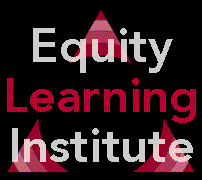Student Fishbowl
This
activity requires 60-90 minutes.
Purpose:
Fishbowl
activities force participants to listen actively to the experiences
and perspectives of a specific group of people. A student fishbowl gives
pre-service and in-service educators an opportunity to hear the experiences,
ideas, and feedback of current students while giving the students an
opportunity to be active in the dialogue on educational equity.
Preparation:
The only
major resources needed for this activity are current K-12 students.
My exerpience has been that eight or ten students comprise an optimum fishbowl group. If your class or workshop
focuses on a particular educational level (i.e., early childhood, secondary,
etc.), you should try to find students at that level to participate.
A useful strategy for finding fishbowl participants is to tap into local
schools.
To prepare
for the actual fishbowl dialogue, ask the fishbowl students to sit in
a circle in the middle of the room. Your class or workshop participants,
or the "observers," should sit in a larger circle around the fishbowl
students.
Instructions:
The following
steps will set the ground rules, then initiate and process the dialogue
for the student fishbowl activity:
- One
important ground rule must guide the participation of the observers:
During the course of the fishbowl, observers are not allowed to speak.
Their job is to listen and learn from the fishbowl students. Mention
that the observers will have an opportunity to discuss any issues
that emerge in later processing dialogue.
- If possible,
assign one of the fishbowl students the role of facilitator. It will
be her or his responsibility to ask questions, facilitate the fishbowl
discussion, and make sure everyone has an opportunity to talk. If
necessary, you can play the role of facilitator.
- The
topics to be discussed by the fishbowl can be developed to be relevant
to your course or workshop. For the most part, fishbowl participants
should have an opportunity to take the conversation where they want
- or need - it to go. If it becomes necessary to push the conversation
along, possible prompts include the following:
- What
are your favorite things about school?
- What
aspects of your school do you feel should be improved?
- What
can your teachers do to help you learn better?
- Share
a story about when one of your teachers did something that made
you feel especially included in the learning process.
- Share
a story about when you felt you were especially excluded from
your own learning process.
- Who
is your favorite teacher? Why?
- Who
is your least favorite teacher? Why?
- What
do you feel is the role of school in your life?
- What
do you feel should be the major goals of schools?
- Make
sure everybody in the fishbowl has an opportunity to talk.
- Allow
the fishbowl discussion to continue for at least 30 minutes. You can
allow it to continue longer if time permits.
- When
the fishbowl discussion winds down, divide the combination of your
participants and the fishbowl students into small groups of 6-10.
This will provide the observers an opportunity to ask for clarification
on comments made during the fishbowl. Instruct the observers that
they are not to invalidate or question the students' experiences or
perspectives. They should use the small group discussions only to
learn more from the fishbowl students. Allow at least 30 minutes for
small group discussions.
- After
small group discussions, call everyone back together. This will be
the final processing discussion. A variety of questions can guide
this conversation:
- To
the observers: Was it difficult to not respond to the fishbowl
students' comments during the fishbowl? Why?
- To
the fishbowl students: How did it feel to share your feelings
about school, knowing that these teachers were listening closely?
- To
the fishbowl students: Do you usually have opportunities to share
your perspectives on school and your education?
- To
the observers: Did you hear anything from the fishbowl that surprised
you?
- To wrap up
the exercise, pose a final question, giving everyone an
opportunity to answer: What is one thing you have learned from this
experience?
Facilitator
Notes:
A few
simple strategies will help you facilitate this activity smoothly. First,
remember that this activity is as much about reminding teachers that
students are their most important resources as it is about teaching.
As mentioned above, it is thus crucial that observers show maximum respect
to the fishbowl students by following the silence ground rule. It may
take some effort to enforce this ground rule, as many teachers are not
fully ready to play the role of learner from people who may be their
own students. Consider writing something on the chalkboard or newsprint
pad such as "We are all teachers. We are all learners."
Student
fishbowl discussions usually are most successful when they are informal.
Remember that the fishbowl students have not had an opportunity to develop
comfort with the participants of your class or workshop.
A noticeable
level of tension often is evident in the room as teachers learn about
their own possible areas for improvement from students and students try to respectfully
critique the people who they have been taught to trust and respect.
A variety of strategies can be used to ease the tension, ranging from
starting with a fun icebreaker to serving snacks.
[ Return to the Awareness Activities Page ]




